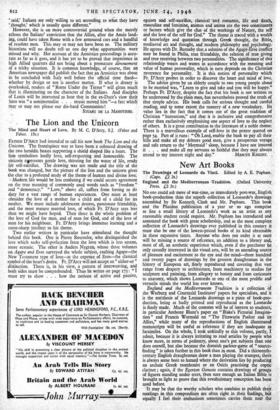• The Lion and the Unicorn
The Mind and Heart of Love. By M. C. D'Arcy, S.J. (Faber and Faber. 15s.)
FATHER D'ARCY had intendx1 to call his new book The Lion and the Unicorn. The frontispiece was to have been a coloured drawing of the two heraldic beasts supporting a shield shaped like a heart. The lion symbolises lordly love, self-respecting and honourable. The unicorn rigaresents gentle love, thirsting for the water of life, ready for self-sacrifice. The drawing was not made and the title of the book was changed, but the picture of the lion and the unicorn gives the clue to a profound study of the theme of human and divine love;
Modern life would be less confusing if we could secure agreement on the true meaning of commonly used words such as " freedom " and " democracy." " Love," above all, suffers from having to do duty for a vast range of human experiences. One must at least consider the love of a mother for a child and of a child for its mother. We must include adolescent desires, passionate friendship, and the most mature married love, of which Fr. D'Arcy says less than we might have hoped. Then there is the whole problem of the love of God for man, and of man for God, and of the love of man for his neighbour. Fr. D'Arcy brings immense learning and a razor-sharp intellect to his theme.
Two earlier writers in particular have stimulated the thought behind this book. One is Pierre Rousselot, who distinguished the love which seeks self-perfection from the love which is less serene, more ecstatic. The other is Anders Nygren, whose three volumes on Agape and Eros surveyed the whole subject, exalting Agape—the New Testament type of love—at the expense of Eros—the classical symbol of the heart's desire. Fr. D'Arcy will not accept an " either-or " distinction. There is, in his view, a pattern of interweaving, and both sides must be comprehended. Thus he writes on page 175: " I must try to show . . . how the notions of active and passive, egoism and self-sacrifice, classical and romantic, life and death, masculine and feminine, animus and anima are the two constituents or factors which give the clue of the workings of Nature, the self and the love of the self for God." The theme is traced with a wealth of knowledge and quotation through Greek thought, the Bible, mediaeval art and thought, and modern philosophy and psychology. He agrees with Dr. Burnaby that a solution of the Agape-Eros conflict may be found in Mania, true friendship, the relation of true giving and true receiving between two personalities. The significance of this relationship waxes and wanes in accordance with the meaning and value of human personality, which in turn depends on the Christian reverence for personality. It is this notion of personality which Fr. D'Arcy probes in order to discover the heart and mind of love.
The advice given by an elderly couple to two young people about to be married was, "Learn to give and take and you will be happy." Perhaps Fr. D'Arcy, despite the fact that his book is not written to be understood by the plain man, has nevertheless proved the truth of that simple advice. His book calls for serious thought and careful reading, and to some extent the mastery of a new vocabulary. Its value lies in the fact that it comes out of the great tradition of Christian " humanism," and that it is inclusive and comprehensive rather than exclusively emphasising one aspect of love to the neglect of others. It is a great contribution to the literature of a noble theme: There is a marvellous example of self-love in the prayer quoted on page 54. Part of it runs : " Oh Lord, enable the bank to pay all their bills and make all my debtors good men, give a prosperous voyage and safe return to the ' Mermaid' sloop, because I have not insured it . . . and make all my servants so faithful that they may always
attend to my interest night and day." MARCUS KNIGHT.






























 Previous page
Previous page